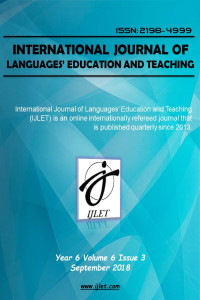The Effects of Affective Factors on the Mastery of Prep Students Studying English at Boğaziçi University
Öz
Anahtar Kelimeler
Affect willingness personality traits language achievement barrier
Kaynakça
- Atsuta, H. (2003). Improving the motivation of unsuccessful learners in the Japanese high school EFL context. ERIC Document Reproduction Service No: ED 476750.
- Avila, J. (2007). Language in Cognition and Affect. London: Springer.
- Beebe, L. M. (1983). Risk-taking and the language learner. In H. W. Seliger & M. H. Long. (Eds.), Classroom oriented research in second language acquisition (pp. 39-66). Rowley, MA: Newbury House.
- Brown, D. (2007). Principles of Language Learning and Teaching, Fifth Edition. New York: Pearson-Longman ESL.
- Crystal, D. (1992). An Encyclopaedic Dictionary of Language and Languages. Cambridge, MA: Blackwell.
- Dewaele, J. M. (2004). Individual differences in the use of colloquial vocabulary: The effects of sociobiological and psychological factors. In P. Bogaards & B. Laufer (Eds), Vocabulary in a second language: Selection, acquisition and testing (p.127). Amsterdam: John Benjamins.
- Dorynei, Z. (1998). Motivation in Second and Foreign Language Learning. Language Teaching, 31, p.117.
The Effects of Affective Factors on the Mastery of Prep Students Studying English at Boğaziçi University
Öz
Theories about how individual variables may result in success in foreign language learning have been a matter for debate for decades. Some learners are more successful than others although they study English in the same learning setting as they bring a variety of personality attributes to language learning. This study aims to explore what effect personality traits can have on learners’ language achievement at the university level and to what extent emotional factors can contribute to student success. A questionnaire in which 34 preparatory students at pre-intermediate level at Bogazici University participated was conducted with a view to determining which factors can influence their learning positively or negatively. In the light of the findings discovered, feeling good about learning called positive affect can enhance and contribute to the mastery of foreign language learning while negative affect will be a psychological barrier to success. To increase learners’ willingness to communicate in a foreign language, instructors should consider affective variables carefully.
Anahtar Kelimeler
Affect willingness personality traits language achievement barrier
Kaynakça
- Atsuta, H. (2003). Improving the motivation of unsuccessful learners in the Japanese high school EFL context. ERIC Document Reproduction Service No: ED 476750.
- Avila, J. (2007). Language in Cognition and Affect. London: Springer.
- Beebe, L. M. (1983). Risk-taking and the language learner. In H. W. Seliger & M. H. Long. (Eds.), Classroom oriented research in second language acquisition (pp. 39-66). Rowley, MA: Newbury House.
- Brown, D. (2007). Principles of Language Learning and Teaching, Fifth Edition. New York: Pearson-Longman ESL.
- Crystal, D. (1992). An Encyclopaedic Dictionary of Language and Languages. Cambridge, MA: Blackwell.
- Dewaele, J. M. (2004). Individual differences in the use of colloquial vocabulary: The effects of sociobiological and psychological factors. In P. Bogaards & B. Laufer (Eds), Vocabulary in a second language: Selection, acquisition and testing (p.127). Amsterdam: John Benjamins.
- Dorynei, Z. (1998). Motivation in Second and Foreign Language Learning. Language Teaching, 31, p.117.
Ayrıntılar
| Birincil Dil | İngilizce |
|---|---|
| Konular | İkinci Bir Dil Olarak İngilizce |
| Bölüm | Araştırma Makalesi |
| Yazarlar | |
| Yayımlanma Tarihi | 30 Eylül 2018 |
| Yayımlandığı Sayı | Yıl 2018 Cilt: 6 Sayı: 3 |

